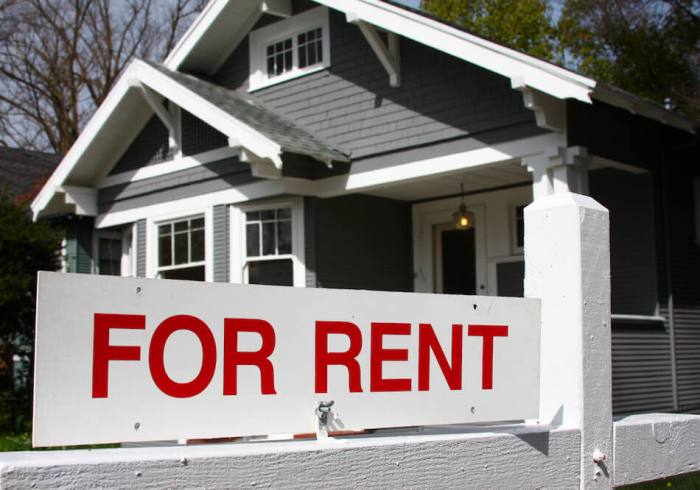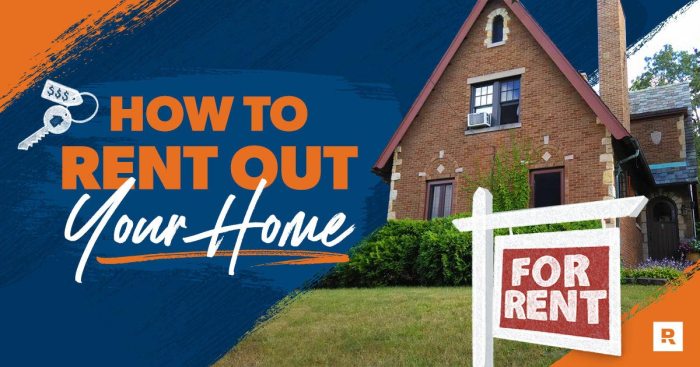How to Find a House to Rent
Defining Your Needs and Budget: How To Find A House To Rent
How to find a house to rent – Finding the perfect rental property involves careful planning and a realistic assessment of your needs and financial capabilities. This section will guide you through defining your ideal rental, establishing a budget, and securing pre-approval for a lease.
Ideal Rental Characteristics and Budget Determination
Begin by visualizing your ideal rental. Consider factors like size (number of bedrooms and bathrooms), location (proximity to work, schools, amenities), and desired amenities (parking, in-unit laundry, pet-friendliness). Research average rental prices in your target areas to establish a realistic budget. Your monthly rent should ideally not exceed 30% of your gross monthly income, leaving ample room for other essential expenses like utilities, groceries, and transportation.
Factor in any additional costs such as pet fees or security deposits.
Securing Pre-Approval for a Rental
Pre-approval significantly strengthens your rental application. Contact your bank or credit union to obtain a pre-approval letter indicating your creditworthiness and your approved rental budget. This demonstrates to landlords your financial stability and commitment, increasing your chances of securing your preferred property.
Prioritized Rental Features
Create a prioritized list of “must-have” and “desirable” features. Must-have features are non-negotiable (e.g., sufficient bedroom space, safe neighborhood). Desirable features are preferences that enhance your living experience (e.g., a balcony, updated kitchen appliances). This list will help you focus your search and make informed decisions when evaluating potential properties.
Utilizing Online Resources
Online rental listing websites are invaluable tools in your search. This section will compare popular websites, guide you through effective search strategies, and help you avoid scams.
Comparison of Online Rental Listing Websites
Several websites offer extensive rental listings. Each platform has its strengths and weaknesses. Below is a comparison of three popular websites:
| Website Name | Pros | Cons | Search Features |
|---|---|---|---|
| Zillow | Extensive listings, user-friendly interface, detailed property information | Can include outdated listings, some listings may be from non-verified sources | Filters for price, location, bedrooms, bathrooms, amenities, pet-friendliness |
| Apartments.com | Wide range of properties, direct contact with landlords, good search filters | May include listings from third-party sites, some listings might be less detailed | Filters for price, location, size, amenities, lease terms |
| Trulia | Detailed property information, neighborhood insights, user reviews | Fewer listings than some competitors, interface might be less intuitive for some users | Filters for price, location, size, amenities, school districts |
Effective Use of Search Filters

Source: stessa.com
Online search filters are crucial for refining your search. Use filters for location, price range, number of bedrooms and bathrooms, pet policies, and desired amenities. Experiment with different combinations to find properties that meet your criteria. Start with broad parameters and progressively narrow your search as you identify properties of interest.
Identifying and Avoiding Rental Scams
Be wary of listings that seem too good to be true, requests for payment before viewing the property, or pressure to act quickly. Verify the landlord’s identity and legitimacy. Conduct thorough online research to check for any negative reviews or reports of fraudulent activity.
Communicating with Landlords or Property Managers Online
Communicate professionally and clearly when contacting landlords or property managers online. State your interest in the property, highlight your qualifications (employment, credit history), and ask relevant questions. Maintain a polite and respectful tone throughout your communication.
Exploring Offline Options
While online resources are dominant, offline methods can also yield promising results. This section explores the advantages and disadvantages of using a real estate agent and other offline strategies.
Using a Real Estate Agent
Real estate agents can offer valuable assistance, providing access to listings not found online, negotiating lease terms, and guiding you through the rental process. However, they typically charge fees, which should be considered.
Local Newspapers, Community Boards, and Flyers
Check local newspapers, community bulletin boards, and flyers for rental listings. This method can uncover hidden gems, particularly in smaller communities or neighborhoods. However, the listings may be less comprehensive than online resources.
Networking with Friends, Family, and Colleagues
Leverage your personal network. Inform friends, family, and colleagues about your search. Word-of-mouth referrals can lead to excellent opportunities not readily available through other channels.
Attending Open Houses, How to find a house to rent
Attending open houses provides a chance to view properties firsthand, ask questions, and interact directly with landlords or property managers. This allows for a more personal and thorough assessment of the property and the landlord.
Evaluating Potential Properties
Thoroughly evaluating potential rentals is crucial to avoid future problems. This section Artikels key factors to consider and provides a checklist for your evaluation.
Key Factors to Consider When Viewing a Property
When viewing a property, assess its condition (structural integrity, cleanliness, functionality of appliances), the neighborhood’s safety (crime rates, proximity to amenities), and the commute to work and other important destinations. Observe the overall ambiance and consider whether the property aligns with your lifestyle and preferences.
Lease Agreement Terms and Conditions
Carefully review the lease agreement. Understand the terms and conditions regarding rent, lease duration, pet policies, responsibilities for repairs and maintenance, and the security deposit.
Thorough Property Inspection
Conduct a thorough inspection before signing the lease. Check for any existing damage, note any necessary repairs, and document everything. This will protect you from being held responsible for pre-existing issues.
Rental Property Evaluation Checklist
Use this checklist to ensure a comprehensive evaluation:
- Overall condition of the property (interior and exterior)
- Functionality of appliances and fixtures
- Safety features (smoke detectors, security systems)
- Neighborhood safety and amenities
- Commute time to work and other important locations
- Lease terms and conditions
- Landlord’s responsiveness and communication
Negotiating and Securing a Lease
This section provides guidance on negotiating lease terms, completing the rental application, and understanding the lease agreement.
Negotiation Strategies
Negotiating the rental price and lease terms is often possible. Present a well-reasoned case for your desired terms, backed by market research and your financial qualifications. Be prepared to compromise and find mutually acceptable solutions.
Completing a Rental Application
Complete the rental application accurately and thoroughly. Provide all requested documentation, including proof of income, employment history, and references. Address any concerns or questions the landlord might have promptly and professionally.
Understanding and Signing a Lease Agreement
Read the lease agreement carefully before signing. Understand all terms and conditions, and ask questions if anything is unclear. Ensure that the agreement reflects your understanding and the agreed-upon terms.
Communicating Regarding Repairs or Maintenance
Maintain open communication with the landlord regarding repairs or maintenance issues. Report issues promptly and follow the procedures Artikeld in the lease agreement. Keep records of all communication and repairs.
Understanding Rental Laws and Regulations
Familiarizing yourself with local rental laws protects your rights and responsibilities as a tenant. This section Artikels essential legal aspects of renting.
Finding the right rental property involves careful consideration of your needs and budget. A key part of your search might involve exploring specific areas, and if you’re interested in the suburbs, you could check out options like those available at houses in penn hills for rent. Remember to also factor in commute times and neighborhood amenities when making your final decision to ensure you find a place that truly suits you.
Rights and Responsibilities of Renters and Landlords

Source: ramseysolutions.net
Understand your rights and responsibilities as a tenant, including those related to privacy, habitability, and lease termination. Similarly, understand the landlord’s obligations concerning repairs, maintenance, and security deposits.
Reporting Violations of Tenant Rights
Know how to report violations of your tenant rights to the appropriate authorities. This may involve contacting your local housing authority or tenant rights organization.
Security Deposit and its Return
Understand the process for receiving your security deposit back after the lease ends. Ensure that you comply with all lease terms and conditions regarding property condition and cleanliness. Request a walk-through inspection with the landlord to document the property’s condition before moving out.
Essential Legal Documents Related to Renting
Several legal documents are relevant to renting. Familiarize yourself with these documents and their purpose:
| Document Name | Purpose | Key Information | Where to Find It |
|---|---|---|---|
| Lease Agreement | Artikels the terms and conditions of the rental agreement | Rent amount, lease duration, responsibilities of landlord and tenant | Provided by the landlord |
| Security Deposit Receipt | Confirms receipt of the security deposit | Amount of deposit, terms of return | Provided by the landlord |
| Rental Application | Used by the landlord to assess the tenant’s suitability | Personal information, employment history, credit information | Provided by the landlord |
| Move-in/Move-out Inspection Report | Documents the condition of the property at the beginning and end of the tenancy | Detailed description of the property’s condition, including photos | Completed jointly by the landlord and tenant |
Essential Questionnaire
What is a good credit score for renting?
Landlords often prefer credit scores above 650, but requirements vary. A higher score improves your chances of approval.
How much should I expect to pay for a security deposit?
Security deposits typically range from one to two months’ rent, depending on local laws and landlord policies.
What if I find a problem with the property after moving in?
Immediately notify your landlord in writing, documenting the issue with photos or videos. Keep copies of all correspondence.
Can I break a lease early?
Lease break clauses vary, but early termination usually involves penalties. Consult your lease agreement or seek legal advice.




















